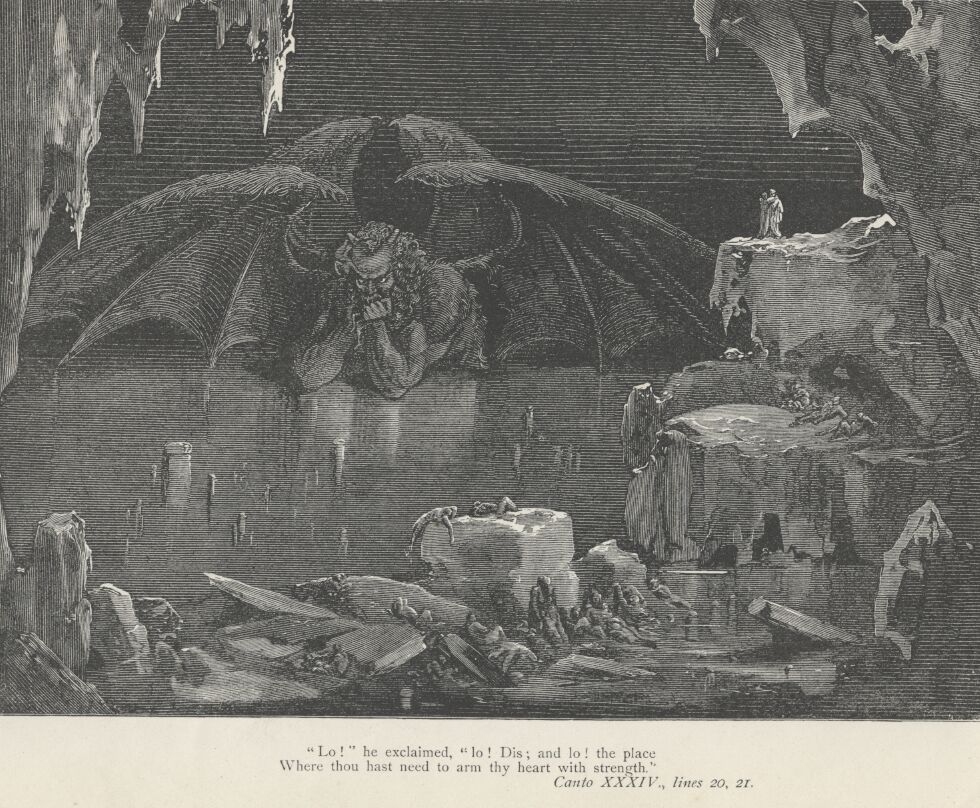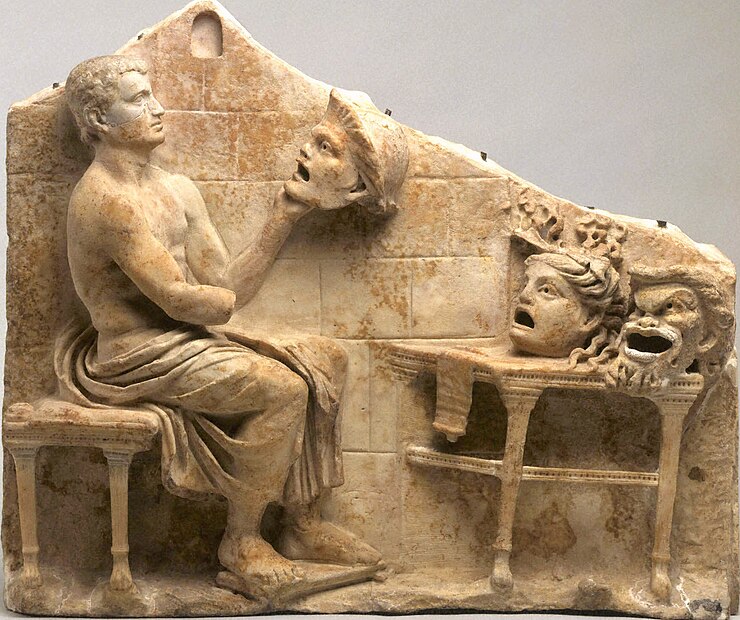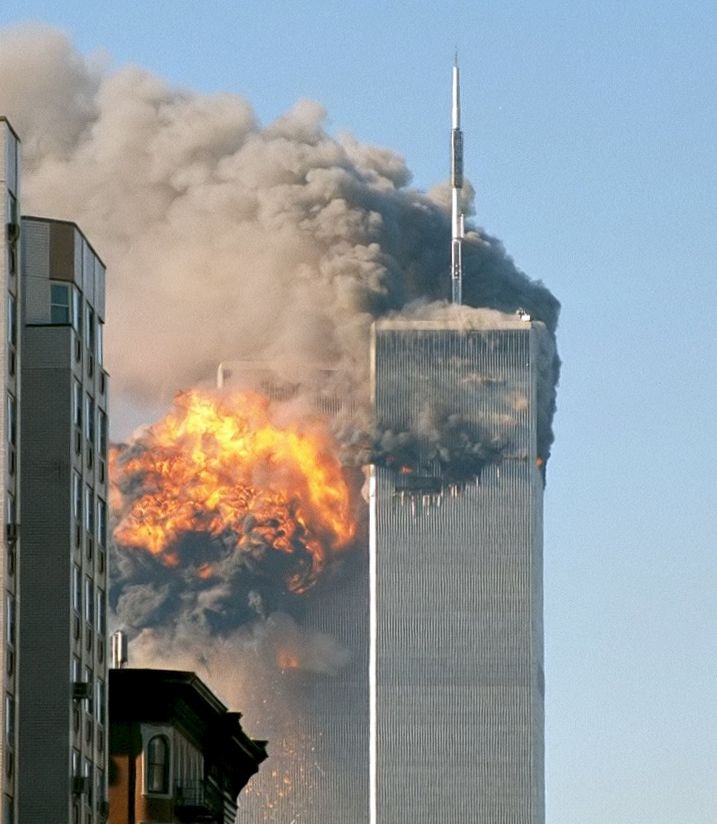
https://upload.wikimedia.org/wikipedia/commons/3/3b/September_17_2001.jpg
Two nights ago I had a dream. I dreamed of a multitude; I dreamed of the multitude. This multitude, these people, were like pieces of glass blown up high in the sky, each one of them constituting, reflecting as it were the image past of an organized whole: the tower of human endeavor rising up to cosmic heights in shafts of fading light.
This was the new face of hell, a snapshot of the billion faces as they fly, slow motion, some chancing to look my way, all tied imperceptibly to an invisible electric hurricane, tendrils of a shape-shifting presence, a hologram of an undefinable contour. This was the closest we ever were to the hidden face of God or the abyss, the mirror and antagonist of the true and best. This was the pulsating rhythm of our everyday poetry, the saving moment of an aesthetic glance, like all those medieval woodcuts and illuminated manuscripts of hell and the apocalypse. This was the one and only true case for globality, as opposed to globalism.
In the dream I was running for shelter to avoid being hit by the debris and shock waves of a huge explosion. I saw a building made of glass and steel, massive, tall, bulky in rectangular and triangular shapes. I saw the building explode and shatter in millions upon millions of glass fragments and shards, each of them a face, contorting or gesticulating, perhaps still not aware of the event. In their minds (they were all only minds now, reflections of minds), they believed perhaps to be going on about their everyday life, a life now thrown up in the air at prodigious speed, flying everywhere in a cloud of damage and harm. This was not a common explosion; no terrorist attack or premeditated event; it wasn’t a case of negligence either, nor was there a natural cause other, I suppose, than the human soul and the deceitful hearts of the multitude.
Contrary to what happened in 9/11, where a bunch of genocidal maniacs, whoever they may be, ended the lives of a multitude of souls in an unforgivable act of madness and selfishness, causing a suffering just as great as the death toll itself, if not greater, in my dream there were no victims: they, we, were all perpetrators, each one of their faces reflected in a piece of ejected glass.
Although many modern people have turned their backs on a literal understanding of Hell as a place of future punishment, they nonetheless draw inspiration from imaginative traditions about the punitive afterlife to cause suffering to others in this present life, to “give them hell”. The modern technologies and rational ways of thinking that supposedly mark our progress over earlier generations now allow us to commit mass murder and replicate infernal landscapes at the touch of a button; in an ironic reversal, we have become the very demons our ancestors trembled to meet when death foreclosed on their lives.
The Penguin Book of Hell (Ed. Scott Bruce, Introduction)
The theme of my dream, its emotional background, the vision generating it, is not uncommon. There was no blame in the dream, not on us all, not on you: the whole thing was mechanistic in some manner. Something that had to happen because this is the way things happen when other things happen the way they do. Like in Dante’s Inferno, the protagonist (humanity maybe, in the dream) has no other way to exit from the Hell he has entered but, this time, in a chaotic outburst out of Satan’s cloaca: Hell, too, a big hole in the ground, and a monstrous parody of a living organism. A parody (who could call it a comedy) of the organized society of men, the living body of humankind, now fettered to the circles of hell suffering in unending, infinite rounds. Down in the darkness we are, in an insane caricature of the shining stones of the heavenly Jerusalem that John of Patmos saw, and so did Blake.

My work in the oratorio brings me frequently face to face with symbols that are very difficult to understand. It is common to read in the commentaries to the Book of the Revelation that, for example, the woman clothed with the sun, which appears in chapter 12 of the book, may be the church, or the community of the faithful. While it seems natural that in an age of persecution and intolerance an author tried to encrypt his message with allegorical images (instead of a diatribe or a direct attack on authority), the impression we get is that this is not the whole story. Revelatory symbols such as those that appear in apocalyptic literature, or in our own dreams, have an aetiology and transcendence that refuses to yield to univocal interpretations. The verb to be in these cases is not followed by an attribute: the woman of the apocalypse is, simply is, with the same right to be that the one we have to be who we are; and we-are is more than any possible interpretation or perversion that can be made of the human in us. The form that humanity or the community of the faithful should have is a mystery that, possibly, can only be understood through images or symbols that transcend it. We are actors in a drama, take part in a plot, without being fully aware of it, and only the visionary distance can render with any hope of intelligibility the shape of it all.
A shape that only great art or visionary prophecy can see.
You may share with me the feeling that we have constructed, step by step, bullet by bullet, policy by policy, a kind of hell on earth. In this we may all agree up to a certain extent. The theatrical setting in which our society moves and acts has little tolerance for “aparts” or soliloquies; these usually remind our masters that we know we are in a play, that we have not completely fallen for it. Those suffering from persistent awareness are taken (by those choosing to look the other way) as symptoms of divergence and, when they cannot be ignored, are commonly punished with some kind of aggressive rhetoric. I myself do not consciously set out to fight the establishment, go against the trend, or anything like that. A functioning society suits me, a paranoid delusional one does not. Freedom of speech and expression favor my work, gagging orders do not. In this all music composers share a common heritage, I believe, and so do all the clowns that benefit from its opposite, whether musical or not.
The work on the oratorio Apocalypsis Iesu was imposed on me from the outside, or maybe from the inside, which for all practical purposes means the same to me. This me, the actor that now writes, has a bit of a difficult role assigned to him. At one point or another we all may develop a particular mindset, a psychological makeup that given the chance may even become conscious; and from then on a potential source of social maladjustment and even trouble: we get that feeling of being a particular someone but it does not quite fit what we see in the bathroom mirror or in Facebook, for that matter. To be a me is a confusing thing, and the trend is to invent it along with others, as we go together hand in hand with all the happy faces around us, like the fabled Lemmings down the cliff. You can be who you want: if you can dream of it, then it is possible, and all those blue sky VIP resort sunny holiday places that you visualize daily will become real too. Only it does not fully work that way. Ever.

A man is great not because he hasn’t failed; a man is great because failure hasn’t stopped him.
Confucius
The construction of a me from the massa confusa of human threads that we usually call personality is, perhaps, the most important influence in the development of my work as a composer. The same as in life, I had to come up with a set of practical rules that would allow my music, my melodies and sonorities, to say something about the way it felt to be musical. I did not need to break the rules as such, it was more like I was using those I needed in order to move forward; forward to somewhere I could not quite see, though. For instance I decided that tonic chord would usually follow the dominant. These kept things simple, sometimes just nice, and also grand if I could come up with a good buildup, or I’d make use polyphony because it gives the density I desire to the music, and better capture the way I think and I go being.
I decided, for instance, that the Tristan chord would not be part of my harmonic vocabulary (or coincide in the voices, although this is not a strict rule); not because I did not like it, but because it always sounds like Wagner. At a certain moment, I came across Riemann’s work and harmonic dualism, in a rather casual way, and I saw that there were interesting and unexplored possibilities in the latter; that, perhaps, was a discovery. The only rule that I impose on my music is that it flows, that it moves, that it opens perspectives instead of closing doors. That it speaks to us all because, after all, it is a gift that I receive to have ears for beauty, with its tenuous but penetrating voice. It is our gift.
For one reason or another these ingredients, these musical decisions I make (together with many others), appear to slow down time somehow. And this is something recurring that others have noticed too. I always remember the reaction of one senior composer when I told him that a piece of mine, Music for a Mushroom Cloud, that he had particularly enjoyed (up to that moment, I guess), was only about 8 minutes long.
His expression flashed from disbelief to derision: serious music has to be long. The oratorio is no exception to this. Up to a point, time slows down enough to allow for a substantial part of our own past, our shared past, to catch up with us and hand us a message. It amazes me that music can do that.
The way I see it, the dream I had had to do with the way I see society, all of us as an agglomerate, an amalgamated whole [now, reading this at the very end of 2021, I feel rather different about the meaning of this dream, more unsettling, like a sinister foreboding o things to come but already on their way]. There is little that I have seen in my travels that reassures me about the ability of large groups of people to organize themselves other than in spontaneous outbursts of emotion or by means of coercion. Emotions can be manipulated, and as a matter of fact they regularly are by channeling their inherent violence to some they or other. And there are plenty of objectifiable they to choose from. Music is guilty of the same too, today more than ever before, with industrial megalomedia cartels transitioning the weakened minds among us into mighty virtual, thoroughly googleized digital avatars, pastoral colors are envisioned with luciferian phosphorescence: flashes of visions past in a manic collage. And yet, “manipulating” emotions was the way in which music acted on the Edenic brutes that composed the audience, the proto-individuals, citizens of the dirt, and civilized them. Only, in the case of the emotions of large groups of people the means are usually more insidious in nature, and coercion is certainly always on the wings. The whole thing was very predictable.
If you were looking outside my window, like I am right now, typing these words, you would see a thick mist spreading. The cityscape engulfed, the anaconda slimy road sparse with vehicles, the forest mountain swallowing the rain, insatiable, never soaked, as if its thirst was immemorial. There are no lights yet, other than the changing colors of the city gates. Birds, stupefied by the rain, fly around not knowing what to do or where to hide; they do get soaked indeed.
How can they be so stupid, I ask myself in a (truly stupid now) anthropomorphism, the trees are just there, spreading for miles and miles, and yet they find no refuge: how can that be? What spurs them to keep flying in this foggy weather and big-drop rain? I am sure the answer is somewhere on the internet. Only I cannot be sure that that would be the right one. I cannot be sure that I won’t get sucked into another rabbit hole of keywords and memes. Another detour, me just a signal, a synaptic agent of the information board, of the cosmic encyclopedia whose Gutenberg we are, each of us a moving block, pressed, oppressed perhaps in order to perform, to leave a print, a (oh irony!) character.

So I don’t, and disliking the rain, I keep on watching while somewhere those birds, those words (that is all it is), those replicants, virtual traces of a soul, keep on flying. I am, too, one of those birds flying in the heavy unwelcome rain and the dancing clouds that touch the ground.
The construction of a me from the massa confusa of human threads that we usually call personality is, perhaps, the most important influence in the development of my work as a composer.
Juscheld
Babel starts when you and I believe we are thinking of different things, while playing the same game, whose rules we cannot even begin to fathom. The tower of Babel was in my dream, a Ziggurat too, intended to connect us with God, where mysteries where enacted high above the hopeful and enthusiastic crowd. We still aim, deep inside, to renew that connection, to participate in the mystery that only kings or high priests and priestesses can witness. We aim, like it says in Genesis, to be like gods, in whichever shape or form they may come to our modern eyes. Only the face of God may have changed imperceptibly for us all, leaving us momentarily perplexed, an exposed to the shadowy, changing shapes of evil. But one thing we seem incapable of doing is stop worshiping some form or other of the divine, now commonly televised. It is paganism pure and simple, although we are are more likely to hear of Google or the Matrix than of some ridiculous goat-like farce. Google, the matrix, the superior alien infiltrators or whatever, can easily be thought of as an update to William Blake’s Polypus, as in the lines: ” No Human Form but only a Fibrous Vegetation, a Polypus of soft affections without Thought or Vision [but malice, we should add]”, in his Milton, 24 :37); or in a more imaginative fashion: “a Polypus of Roots, of Reasoning, Doubt, Despair & Death, going forth & returning from Albion’s Rocks to Canaan,devouring Jerusalem from every Nation of the Earth” (Jerusalem 69:3).

Globalism is our newest polypus attempt to reach God, extending within and without in an attempt to see his face, creating a new repugnant mask instead; another one. As all borrowed aesthetics ever before us and of those to come, a bad copy, a defective model, broken earthenware that no Faustian devil can mould right or straight. The same as the aestheticians of the atrocious, failed artists really, still swimming underwater unredeemed, ignorant that the Flood receded long ago, so it goes for religious fanatics and atheists: whatever you are, whoever, whatsoever you believe or disbelieve, there is always a door, open or shut, behind which the call resides. It is the scariest place and the most human all the same, and as a matter of fact the most likely to give meaning to that word, human, as opposed to the beasts we have become. Like Babel, globalism is a chimera, a wrapper of friendship and brotherhood that announce the pompous advent of some fallible fool or diseased clan as universal rulers of our pale blue dot, and the one rule of law for the lion and the ox. The image is truly apocalyptic in its literal sense, utopian, and for that very same reason plausible to the longing and yearning of the human soul. Although no less abhorrent to life and taste.
Globalism, like any other –ism, is worship: “globality” is for better or worse a reality to work on; one affecting every man and woman on this planet and with increasing efficacy. Globalism is ahistorical and anti-historical (just like any other utopia). And history is a lesson and a lie. A world of idiots does not necessarily resemble paradise, nor that it is intended either, and the lion will never sit near the sheep for long unless the one makes a rug of the other.
This, contradictory as it may seem, may perhaps be a hopeful state of affairs, and a revelatory one at that: to call the beast by its proper name, and to give back to Caesar his coined deceits, to live with it to fight another day. Globality is a world of merchants, money, war, and lies; globalism the ultimate dehumanizing nightmare. Yes, I said that: there are worse things than war, even when war is the worst of what we know. Like in the Book of Revelation, the baffling impossible image of the Beast reminds us that what is beyond understanding may turn out to be, not God, but a devilish trap. It is not the rich and powerful that must fall, but the deceiving and pernicious evil they cohabit with: the Dragon, the Beast, and the mythic Whore of Babylon are all symbols of a shared bad conscience and the shadow of our guilt (yes, ours), that follows us all.

The building in my dream had a contemporary architectural plan, such as “The Scalpel” skyscraper in London, or the Shimao International Plaza in Shanghai, or any other contemporary similar building in most capital cities in the world (Image Wikipedia Commons).
